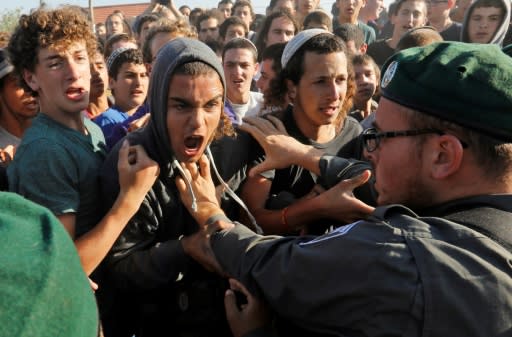Israel police evict wildcat settlers as deadline looms
Israeli police began evicting settlers from homes in a West Bank outpost on Tuesday ahead of a court deadline to leave structures partially built on Palestinian land, an AFP correspondent reported. Young boys in tears were followed by a young woman holding a baby, as they were escorted out of their home in the Netiv Haavot neighbourhood of Elazar settlement, south of Jerusalem. They left without any resort to physical contact by the unarmed police. In February, Israel's Supreme Court gave the settlers until June 15 to vacate 15 homes found to have been built partly on private Palestinian land. An estimated 2,000 people, most of them young activists, had travelled to the outpost to support the settlers and protest against their eviction. Large Israeli flags were flying on some of the rooftops, as well as signs pledging to return to the site. After morning prayers, men sang and danced in a show of faith outside the homes to be razed. Police entered house after house, escorting residents and supporters or in some cases carrying them out without objection. By the early afternoon, only one house remain occupied, with dozens of youths standing on its roof, as police assessed how to tackle the potentially volatile situation. - 'Peaceful protest' - Resident Aviad Amitai said that Tuesday marked the start of a three-day process, with police clearing people from the houses subject to the court order before demolishing them. "We have a peaceful protest, we are law-abiding people, we are not going to show any violence here," Amitai told AFP. Police spokesman Micky Rosenfeld said that while residents did not want the event to be violent, "we've seen in previous evacuations police officers being injured as a result of stones or violent incidents." He said that to keep away those intent on violence, police had set up roadblocks and denied access to 10 people. Police deployed 500 officers to secure the location and "continue to evacuate the area, step by step". Rosenfeld said the eviction of the 15 families was expected to take "at least several hours, probably the whole day." Hananel Dorni, chairman of settler group the Yesha council, said the court's decision to demolish the homes was "unwarranted". Agriculture Minister Uri Ariel, himself a settler, said the discussions leading up to the court's decision were like those in Sodom and Gomorrah, ancient cities that according to the Bible were demolished by God for their sinfulness. Ariel tweeted from Netiv Haavot that he would "not relent" before settling "all of the land of Israel." The right-wing government of Prime Minister Benjamin Netanyahu draws support from the settlement movement and has settlers in top cabinet posts. It has approved a plan to build 350 homes at new plots in Netiv Haavot. The plan also reportedly includes some 60 million shekels ($17 million, 14 million euros) in compensation for the settlers leaving the homes to be demolished and provision for temporary housing for them until construction is complete. All Israeli settlements are viewed as illegal under international law, but Israel differentiates between those it has approved and those it has not. Peace Now, an Israeli NGO, said the Palestinian owners of the land to be vacated have been seeking to have their property restored since the settlers arrived there in 2001. Israel occupied the West Bank in the Six-Day War of 1967. Settlements there are seen as major stumbling blocks to a peace deal since they are built on land the Palestinian wants for their future state. An Israeli police officer scuffles with activists as colleagues begin evicting 15 families from the Netiv Haavot settlement outpost in the occupied West Bank on June 12, 2018 in accordance with a Supreme Court order Israeli activists scuffle with police at the Netiv Haavot settlement outpost in the occupied West Bank on June 12, 2018 in protest at the eviction of 15 families in accordance with a Supreme Court order



